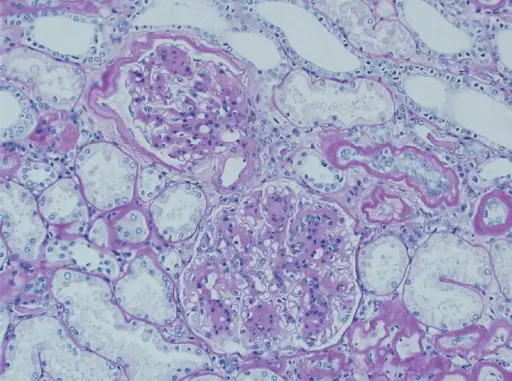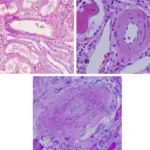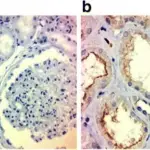Malignant nephrosclerosis is a renal disease linked with the malignant and/or enhanced phase of hypertension.
What is the Pathology of Malignant Nephrosclerosis?
The pathology of malignant nephrosclerosis is:
-Etiology: The cause of malignant nephrosclerosis is idiopathic, long-standing hypertension.
-Genes involved: APOL1 gene.
-Pathogenesis: The sequence of events that lead to malignant nephrosclerosis unclear, kidney vascular damage from chronic benign hypertension, vascular fibrinoid necrosis, and mitogenic factor from platelets and plasma, result in hyperplastic arteriolosclerosis, a typical of malignant hypertension.
-Morphology: The morphology associated with malignant nephrosclerosis shows small, pinpoint petechial hemorrhages on the cortical surface.
-Histology: The histology associated with malignant nephrosclerosis shows fibrinoid necrosis of arterioles and interlobular arteries intimal thickening.
How does Malignant Nephrosclerosis Present?
Patients with malignant nephrosclerosis typically slightly high in females present at the age range of 45-65 years. The symptoms, features, and clinical findings associated with malignant nephrosclerosis include headaches, nausea, vomiting, hypertension, hypertensive retinal changes, proteinuria less than 0.5 g/d, encephalopathy, cardiovascular abnormalities, and renal failure.
How is Malignant Nephrosclerosis Diagnosed?
Malignant nephrosclerosis is diagnosed through clinical presentation, lab works- Urinary albumin-to-creatinine ratio, serum potassium, calcium, blood glucose, lipid panel, urinalysis. Imaging studies such as echocardiogram assess left ventricular size, ultrasonography, electrocardiogram (ECG).
How is Malignant Nephrosclerosis Treated?
Malignant nephrosclerosis is treated through managing hypertension with antihypertensive.
What is the Prognosis of Malignant Nephrosclerosis?
The prognosis of malignant nephrosclerosis is good. About 75% of patients will survive 5 years.



